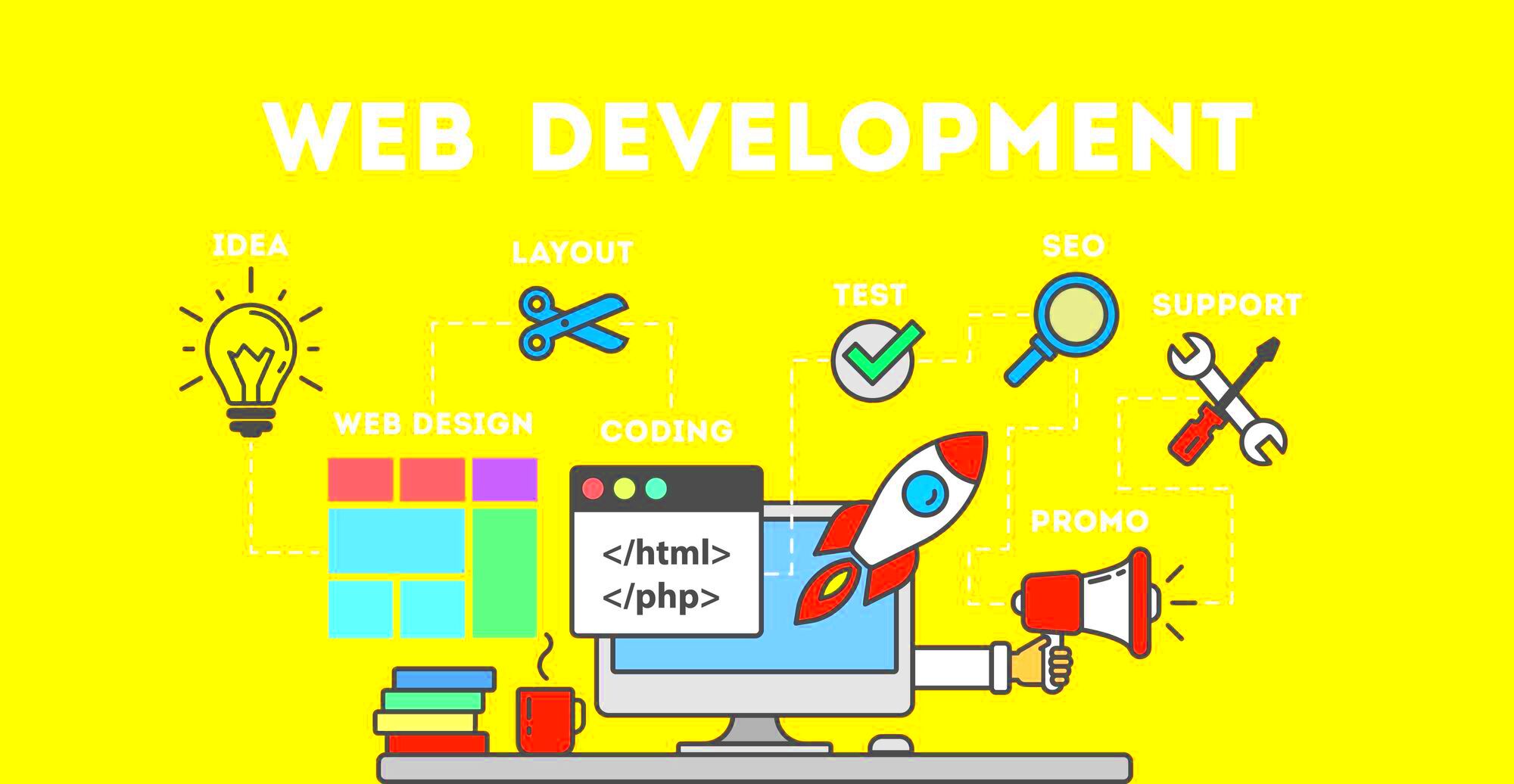Freelance web development offers an exciting career path for those who love coding and designing websites. It allows flexibility, the chance to work with different clients, and the opportunity to build your own business. Whether you're interested in front-end, back-end, or full-stack development, freelancing enables you to choose projects that match your skills and interests. The ability to work from anywhere, set your own rates, and determine your schedule makes this a popular choice for many developers.
Essential Skills for Becoming a Web Developer

To become a successful web developer, there are several skills you'll need to master. These skills will not only help you deliver great websites but also make you stand out in the competitive freelance market.
- HTML & CSS: The foundation of web development. HTML structures the website, while CSS handles the styling.
- JavaScript: This programming language adds interactivity to websites, such as buttons, forms, and animations.
- Responsive Design: With more people browsing on mobile devices, understanding how to create websites that work well on all screen sizes is crucial.
- Version Control (Git): Using Git helps you keep track of changes in your code and collaborate with other developers.
- Web Hosting & Domain Management: Knowing how to deploy and maintain websites is vital for a web developer.
- Frameworks & Libraries: Familiarity with tools like React, Angular, or Vue.js can make you more efficient and help you build better websites.
Besides technical skills, a web developer should also have problem-solving abilities, good communication skills, and the capacity to learn and adapt to new technologies as the field evolves.
Also Read This: How to Find Purchased Gigs on Fiverr
Building a Strong Portfolio for Freelance Work

A strong portfolio is essential for attracting clients as a freelance web developer. It serves as proof of your skills, experience, and the quality of your work. Here are some tips for building a portfolio that stands out:
- Showcase Your Best Work: Include only the projects that demonstrate your strongest abilities. Quality is better than quantity.
- Include a Variety of Projects: Feature a range of projects such as personal websites, client work, or open-source contributions to show your versatility.
- Provide Context: For each project, explain the problem you solved, the tools you used, and the results. This helps clients understand the value you bring.
- Highlight Your Process: Show how you approach a project, from initial planning to final launch. Clients appreciate understanding how you work.
- Use a Clean, Professional Design: Your portfolio itself should reflect your web design skills. Make sure it is easy to navigate and visually appealing.
- Keep It Updated: As you complete new projects, update your portfolio regularly. An outdated portfolio can make clients question your active engagement in the field.
By focusing on these key elements, you can build a portfolio that not only demonstrates your skills but also positions you as a professional in the competitive freelance web development market.
Also Read This: How to Promote Your Gig on Fiverr
Choosing the Right Platforms for Freelancing

When you're starting out as a freelance web developer, picking the right platform to find clients is essential. Each freelancing website offers different features and benefits, so it’s important to choose one that fits your skill set, goals, and work style. Popular platforms like Fiverr, Upwork, and Freelancer.com provide opportunities to connect with clients worldwide. However, the platform you choose can affect your visibility, competition, and the types of clients you attract.
- Fiverr: Great for developers who want to offer specific services like website design, bug fixes, or WordPress development. Fiverr allows you to create “gigs” and attract clients looking for those exact services.
- Upwork: Ideal for developers seeking long-term projects or ongoing work. Upwork allows you to bid on projects posted by clients, and you can build strong relationships over time.
- Freelancer.com: Offers a mix of short and long-term opportunities. It’s competitive, but you can find projects in various niches, from front-end to full-stack development.
- LinkedIn: While not a freelancing platform, LinkedIn is an excellent way to connect with potential clients. It helps you build a professional network and showcase your portfolio.
Choosing the right platform ultimately depends on your goals, whether you want quick, small projects, or long-term, larger contracts. It’s a good idea to explore multiple platforms to find the best fit for your work style and career goals.
Also Read This: How to Buy Reviews on Fiverr: A Comprehensive Guide
Setting Your Rates and Managing Client Expectations
Setting the right rates and managing client expectations are crucial to running a successful freelance web development business. If you price your services too low, you may attract clients who don’t value your work. Price too high, and you might miss out on opportunities. Here are some tips to help you set fair rates and maintain healthy client relationships:
- Research the Market: Before setting rates, research what other web developers are charging. Consider your experience, the complexity of the project, and your location to determine a fair price.
- Hourly vs. Project-Based Rates: Decide whether to charge an hourly rate or a fixed project rate. Hourly rates are great for ongoing work, while project rates give clients a clear budget.
- Be Transparent: Discuss your rates upfront, and make sure clients understand what is included in the price. For example, let them know if revisions or maintenance are extra.
- Set Clear Deadlines: Establish clear timelines for project milestones and completion. This helps manage expectations and avoid misunderstandings.
- Communicate Regularly: Keep clients updated throughout the project. Regular communication helps ensure you're on the right track and can resolve issues quickly.
By setting fair rates and managing client expectations from the start, you can ensure long-term success and build lasting client relationships.
Also Read This: Is Fiverr Trustable? Unveiling the Truth Behind the Freelance Marketplace
How to Market Yourself as a Web Developer
Marketing yourself effectively as a freelance web developer is key to attracting clients and growing your business. It’s important to not just rely on freelancing platforms but to also build your personal brand and expand your reach. Here are some ways to market yourself as a freelance web developer:
- Build a Professional Website: Your website is your online portfolio and serves as your first impression. Ensure it’s well-designed, easy to navigate, and includes examples of your best work, client testimonials, and clear contact information.
- Network Online: Join developer communities on platforms like GitHub, Stack Overflow, or Twitter. Engaging with these communities helps you stay updated and build a network of potential clients and collaborators.
- Utilize Social Media: Platforms like LinkedIn, Twitter, and Instagram are powerful tools for sharing your work, insights, and updates. Use them to highlight your skills and achievements, and connect with clients and other developers.
- Content Marketing: Write blog posts, create tutorials, or offer valuable content on topics related to web development. This can position you as an authority in your field and attract potential clients.
- Leverage Referrals: Ask your satisfied clients for referrals or testimonials. Word-of-mouth marketing is highly effective, especially in the freelance world.
By combining these strategies, you can effectively market yourself, build your reputation, and attract the right clients for your freelance web development business.
Also Read This: How to Launch Your Career as a Freelance WordPress Developer
Common Challenges in Freelance Web Development
While freelance web development offers many perks, it also comes with its own set of challenges. Understanding these hurdles can help you navigate the ups and downs of freelancing more effectively. Here are some of the most common obstacles freelancers face in web development:
- Finding Consistent Work: One of the biggest challenges is maintaining a steady stream of clients. Freelance developers often experience periods of high demand followed by slow times. It’s important to always be on the lookout for new opportunities and actively market yourself.
- Managing Finances: As a freelancer, you’re responsible for your own taxes, health insurance, and retirement planning. Without a steady paycheck, it can be difficult to manage your finances and save for the future. It’s essential to set aside money for taxes and emergencies.
- Client Communication: Clear communication is key to successful projects. Misunderstandings can lead to delays or unsatisfied clients. Setting expectations from the start and keeping clients informed throughout the project is critical.
- Time Management: Balancing multiple projects with deadlines can be tricky. It’s easy to get overwhelmed with too much work. Using time management tools, like Trello or Asana, can help you stay organized and keep track of your tasks.
- Dealing with Difficult Clients: Not all clients are easy to work with. Some may have unrealistic expectations or be hard to communicate with. It’s important to stay professional, set boundaries, and know when to walk away from a project if it’s not a good fit.
By anticipating these challenges and preparing for them, you can manage your freelance career more effectively and minimize the impact of these issues.
Also Read This: Does Fiverr Really Pay? Unveiling the Truth Behind Freelance Earnings
FAQ
Here are some frequently asked questions that new freelance web developers often have:
- How do I find my first freelance client? Start by offering your services on freelancing platforms like Upwork or Fiverr. Networking, joining web development communities, and showcasing your portfolio on your personal website can also help.
- What should I charge as a freelance web developer? Rates can vary depending on your experience, skill set, and the complexity of the project. It’s important to research market rates and consider the value you provide to clients. You can charge hourly or on a per-project basis.
- How do I handle difficult clients? Always maintain professionalism and set clear expectations upfront. If a client becomes difficult, communicate openly and try to resolve issues through discussion. If necessary, don’t hesitate to end the project if it’s not working out.
- Should I specialize in one area of web development? Specializing can help you stand out, but being a generalist can also attract a wide range of clients. It depends on your preferences and the demand in your area of interest. You could start with a broad skill set and narrow down as you gain more experience.
- How do I stay updated with the latest web development trends? Follow web development blogs, participate in online communities, attend conferences, and take online courses to stay up to date with the latest tools, frameworks, and trends in the industry.
Conclusion
Freelance web development is a rewarding career, but it requires dedication, hard work, and the ability to adapt to new challenges. By mastering the necessary skills, choosing the right platforms, managing your rates and client expectations, and marketing yourself effectively, you can build a successful freelance business. While the road may be filled with ups and downs, the flexibility and independence of freelancing make it a great option for developers who enjoy solving problems and working on diverse projects. Keep learning, stay motivated, and always strive to deliver high-quality work, and success will follow.




